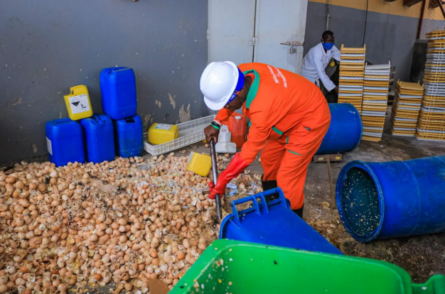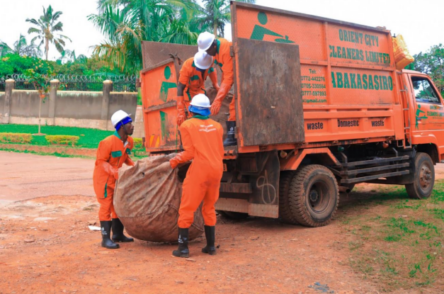Waste management for slum settlements in Mbale City: A search for sustainable solutions
Metrics
Community
Mbale CityCommunity Size
96,189University
Makerere University and the International University of East AfricaYears
2023- PresentStatus
In ProgressCase Type
Project StoriesFocus Areas
Pollution, Sustainability, Waste ManagementRegion
AfricaCommunity Partner Department
City CouncilSustainable Development Goals
11 Sustainable Cities and Communities, 6 Clean Water and SanitationMbale is currently facing a waste management crisis. While the city has a waste dumping site controlled by Mbale City Council, the site is not optimized as its management is neither efficient nor effective. The entrance to the site is often blocked by waste that is not routinely cleared, which affects movement of waste management trucks. Open dumping, the practice of dumping waste in an area with no environmental protection or control, is the main waste management practiced used in the area and does not permit adequate sorting of wastes for reuse and recycling.
The problem of waste management is most profound in areas occupied by low-income earners and slum settlements. The settlements do not have a coherent, acceptable, and sustainable waste management plan. Subsequently, there is no sustainable waste management strategy in the settlements. As a result, there is continued disposal of waste in public spaces such as roads, paths, drainage channels and water bodies. Other wastes are burnt or composted depending on individual households living conditions.
Furthermore, Mbale City has privatized its waste collection which has created many different challenges. Many community members have not been adequately sensitized to appreciate the value of private waste collectors. Instead, they perceive waste management as a public/government function. Therefore, the communities do not fully support paying for the wastes they generate. Under the private waste collection scheme, waste collectors mainly serve those who can pay for the collection. All those who cannot afford private waste collectors use alternative methods such as composting, open dumping on roads and water bodies, or waste burning. Slum dwellers often live in areas that lack space for composting or onsite waste management, so they often hide waste in the backyard and give it to children to dump in whatever space where it is convenient for them.

The indiscriminate dumping of wastes occasioned by inadequate waste collection has led to many environmental challenges. These include unsanitary living conditions that affect quality of life, water and air pollution, and the clogging of man-made and natural drainage systems that have led to flooding. Similarly, the large amount of waste left in public areas such as drainage channels and road reserves has led to unhygienic living conditions that affect working spaces and livelihoods of slum dwellers. Business owners living in slums tend to attract low-value clients with low purchasing power. This system perpetuates the cycle of poverty, hence, an improvement in living conditions could have a proportionate increase in slum dweller’s livelihoods and quality of life.
To address these issues, the city is required to generate data and provide a situational analysis of waste management perception and practices. Students and staff from Makerere University and the International University of East Africa, will collaborate with Mbale City Council under the EPIC framework. They will examine the types of waste slum dwellers generate, analyze the current waste management strategies, discover why the problem has persisted, what actors influence waste management, and how sustainable strategies can be implemented to improve the problem. In this project, students and staff will visit Mbale City and the slum settlements to meet with representatives of Mbale City Council, representatives of the Slum Dwellers Federation (SDF), dialogue with community members, and interview private waste collection companies to seek solutions to these questions.
Overall, the project seeks to provide a baseline survey report on the status of waste management in Mbale City, by developing a stakeholder map of actors in waste management and how they relate to one another. The project team will also generate a waste management handbook based on the socio-economic, cultural, and spatial environmental conditions of Mbale City. Dissemination materials will include fliers, calendars, and charts on the sustainable waste management cycle. These deliverables will make a positive contribution to how waste is managed in Mbale, change how individuals perceive waste, and increase awareness of sustainable waste management strategies.
The project will focus on the five main slum settlements in Mbale including Mooni-Mukhubu, Busamaga, Namakwekwe, Nkoma, and Namatala. This is because many residents in these areas cannot afford to pay for private waste collectors. Yet, many citizens in these communities, specifically women and the elderly, run various small businesses. The pollution from the waste crisis becomes a great detriment to these business as the pollution generates flies and unpleasant smells causing customers to forgo visiting the businesses. This is a great hindrance to gender equality and contributes to the growing poverty levels of the city.

To represent these communities effectively, the SDF participated in program identification, data collection, and stakeholder mapping along with the Mbale City Council and the Community Development Officer who provided an important mobilization role. Students from Makerere University’s Urban and Regional Planning specializing in Physical Planning Studio and Urban Governance and Management will be involved in data collection and analysis and draft report writing. The project will build capacity in various data collection and analysis methodologies to enable SDF to update their waste management database as a monitoring tool on the performance of the new data management strategy handbook on waste management.
Adequate waste management will improve sanitation and the physical and environment of the city, as well as strengthen partnership between Makerere University, Mbale City Council, SDF and the slum dwellers. This EPIC partnership and project will open up new employment opportunities, enhance existing ones and promote sustainable livelihoods. This in turn will contribute to lower pollution levels and leading to a safer and healthier environment for the slum communities.
This project is ongoing.

